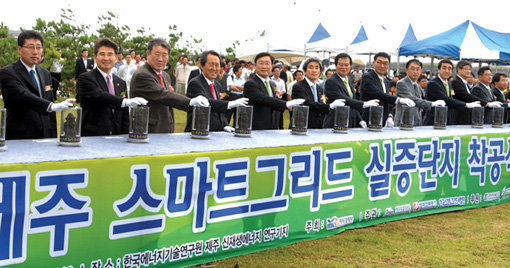Korea Tries to Materialize Smart Grid Scheme
Inaugurates the Smart Grid Business Corps for management of smart grid

Korea is quickly moving to nurture smart grid technology as a growth engine of the national economy in the next two to three decades, as the Korean shipbuilding, semiconductor and automobile industries have done.
The government on Aug. 20 inaugurated the tentatively named Smart Grid Business Corps, charged with initiating collaboration among industry, academia and research circles in building smart grid infrastructure.
A signboard-hanging ceremony to celebrate the inauguration of the Smart Grid Business Corps took place at the Green Power IT Center in Uwang, Gyeonggi Province with about 40 dignitaries, including Kim Jung-kwan, deputy minister for energy resources development at the Ministry of Knowledge Economy (MKE); KEPCO Vice President Kim Moon-duck; Lee Joon-hyun, president of Korea Institute of Energy Technology Evaluation & Planning; Yoo Tae-hwan, president of Korea Electrotechnology Research Institute; and Choi Jin-yong, president of Injin Electric.
The Smart Grid Business Corps was established for the overall management and implementation of smart grid projects. In particular, given the need for grafting such areas as power information and technology, the existing Power IT Business Corps was expanded to inaugurate the Smart Grid Business Corps, which will be charged with responsibilities ranging from support to power-IT convergence technology and manpower development, said Lee Ho-joon, director in charge of the power industry at the MKE. Prior to the inaugural ceremony, the Smart Grid Business Corps held a board meeting and approved a reorganization plan calling for shifting the existing two teams into one office and three teams ¡ª the Management Support Office, responsible for overall support; the Domestic Supply Team for supporting the establishment of the national smart grid; the Export Strategy Team, charged with Korea¡¯s entry into the global smart grid market; and the Policy Support Team, responsible for the establishment of a roadmap and infrastructure.
On July 27, the screening committee for selecting the head of the Smart Grid Business Corps approved the appointment of Kim Jae-sup to become the first president of the corps. Kim, who passed the 22nd higher administration examination, held such positions as planning and budget director, management and planning office head, knowledge & information center chief and Seoul Postal and Communications head.
Deputy Minister Kim said in a message at the ceremony, ¡°Korea, which was designated as the leader of the smart grid field at the G-8 Summit held in Italy, has been asked to take the lead in responding to climate change from the international community, and the smart grid will not just contribute to wisely overcoming challenges caused by climate change, but serve as an opportunity for Korea to develop related industries and for Korean companies to make a leap by advancing into the overseas market.¡± He urged the corps to do its best in realizing the goal of building the world¡¯s first national smart grid.
Kim, president of the Smart Grid Business Corps, said, ¡°I expect the smart grid to evolve into a new industry that will drive Korea for 20 to 30 years, as the Korean shipbuilding, semiconductor and automobile industries do.¡± He said the smart grid is the only alternative for responding to climate change and his corps will do its best in producing results by strengthening collaboration among industry, academia and research circles and implementing projects fitting the current reality. Earlier, Korea and the United States signed a deal to jointly develop the ¡°Smart Grid,¡± a next-generation power grid based on information technology. Korean Minister of Knowledge Economy Lee Youn-ho, who accompanied President Lee Myung-bak on a state visit to the United States, and U.S. Secretary of Energy Steven Chu concluded a comprehensive Statement of Intent (SOI) to promote cooperation in the energy sector, including the Smart Grid, on June 15 in Washington.
If the two countries take the lead in setting global standards on Smart Grid technology by capitalizing on a combination of U.S. advanced protocol technology and Korea¡¯s application and commercialization capability, they are forecast to control the upcoming global Smart Grid market whose size could grow to at least 100 trillion won by 2030, industry analysts said. On the same day, Korean member companies of the Korea Smart Grid Association (KSGA) and U.S. counterparts of the GridWise Alliance held the first Korean-U.S. Smart Grid Investment Forum at the Capital Hilton Hotel in Washington and declared across-the-board collaboration on technology development and investments.
A Smart Grid is a next-generation, intelligent electricity network that connects an energy network and a communications network by grafting information technology.
The Smart Grid market is predicted to see its revenues surging by an estimated $200 billion yearly after 2015.
Smart grids can also help the country nourish the renewable energy sector so that hybrid or plug-in electric cars that require detailed monitoring of power quality can make their debut.
The Jeju test-bed selected recently will be the first of its kind to experiment most systems related to the operation of smart grids.
If the development of smart grids is successful, it could help increase the percentage of green energy in the country from 2.4 percent of the total power produced at present to 11 percent in the next two decades. It can reduce carbon dioxide emissions that cause global warming by 41 million tons, fuel domestic production by 68 trillion won ($53 billion) by 2030 and create 500,000 new jobs, the MKE said. nw
Dignitaries attend a ceremony to launch the smart grid trial complex project in Gujwa-eup, Jeju Island on Aug. 31.
3Fl, 292-47, Shindang 6-dong, Chung-gu, Seoul, Korea 100-456
Tel : 82-2-2235-6114 / Fax : 82-2-2235-0799